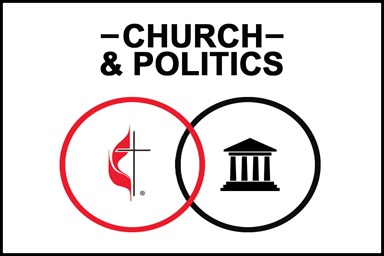United Methodist leaders are strongly supporting a bipartisan bill in Congress that would extend protection from deportation for young people brought into the United States illegally as children.
Nearly 750,000 young people, known as “Dreamers,” are part of the Deferred Action for Childhood Arrivals or DACA program, created by the Obama administration.
President Trump has moved quickly toward much more aggressive enforcement of immigration laws, fulfilling a campaign promise to secure the country’s borders and crack down on people who came to the United States illegally.
So far, the Trump administration has left DACA alone. Trump has spoken sympathetically of the Dreamers.
"We're gonna show great heart," he said last week. "DACA is a very, very difficult subject for me, I will tell you."
But there’s been no explicit commitment to preserving DACA, and a Trump spokesman, Sean Spicer, said: “Everyone who is here illegally is subject to removal at any time.”
That’s why, said Jeania Ree V. Moore, director of Human and Civil Rights for the United Methodist Board of Church and Society, Congress needs to pass the Bar Removal of Individuals who Dream and Grow our Economy Act.
The legislation, also known as the BRIDGE Act, would provide relief from deportation for up to three years.
“In protecting DACA recipients, the BRIDGE Act seeks to protect these individuals and the immense contributions they bring to the American public,” said Moore. “They are university students, veterans of our military, leaders of our faith communities (including United Methodist churches), and valued workers. They are cherished members of society.”
Moore added that DACA recipients often provide vital financial support for their families.
“If you assume each recipient has at least two family members, that is almost 1.5 million people immediately affected in concrete financial ways,” she pointed out.
The United Methodist Church is part of the Interfaith Immigration Coalition, which issued a letter arguing that ending DACA without passing the BRIDGE Act would damage the U.S. economy.
“Ending DACA would eliminate an estimated $433.4 billion from the U.S. gross domestic product and $24.6 billion in Social Security and Medicare contributions over a ten year period,” the Jan. 13 letter said. “We urge all members of Congress to co-sponsor the BRIDGE Act and send a strong message that rescinding DACA has severe moral and economic consequences that Congress cannot allow or afford.”
According to Moore, the BRIDGE Act aligns with the denomination’s witness on immigration as people of faith. At the 2016 United Methodist Church General Conference in Portland, Oregon, the body amended and readopted Resolution #3281, “Welcoming the Migrant to the US.”
“In this resolution, the church affirmed hospitality, a welcome, and love for the sojourner as biblically mandated—as God’s call on the people of God to welcome the sojourner in our midst,” said Moore. “Theologically, the church recognizes that ‘Jesus fully identifies with the sojourner to the point that to welcome the sojourner is to welcome Jesus himself.’”
The BRIDGE Act is co-sponsored by Sen Lindsey Graham, a Republican from South Carolina, and Sen. Dick Durbin, a Democrat from Illinois.
“It’s my firm belief most Americans want to fix a broken immigration system in a humane manner,” Graham said in a statement. “In my view, the DACA Executive Order issued by President Obama was unconstitutional … However, I do not believe we should pull the rug out and push these young men and women — who came out of the shadows and registered with the federal government — back into the darkness.”
Durbin touted the accomplishments of the young people in question.
“Since the establishment of DACA, we’ve witnessed them realize their full potential — by opening businesses, becoming doctors and teachers, and serving our country in uniform,” Durbin said. “We cannot squander that talent and dedication and send them back to countries they barely know.”
Moore hopes individual United Methodists will phone or write their members of Congress, expressing support for the BRIDGE Act.
Evangelical groups also are among those supporting the legislation.
In an interview with Time magazine before taking office, Trump promised his administration would “work something out” for the Dreamers, but did not give details.
The Rev. Gustavo Vasquez is the director of Hispanic/Latino Communications at United Methodist Communications. You can reach Vasquez at (615)742-5111 or [email protected].
Like what you're reading? Support the ministry of UM News! Your support ensures the latest denominational news, dynamic stories and informative articles will continue to connect our global community. Make a tax-deductible donation at ResourceUMC.org/GiveUMCom.




